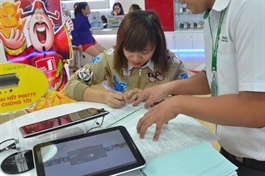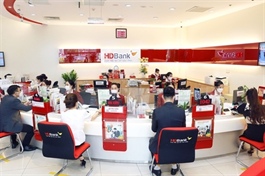Banks get moving with fresh deals
Banks get moving with fresh deals
The Vietnamese banking sector continues to be characterised by a dynamic merger and acquisition landscape, driven by domestic consolidation and foreign investment.

At last week’s AGMs, numerous credit institutions expressed their intention to execute more buyout deals, as it is likely that merger and acquisition (M&A) activity in the banking sector will remain a key driver of change and innovation in the industry.
One key aspect that the Sacombank’s board addressed is the foreign ownership limit (FOL) of the bank’s shares. In May 2021, Vietnam Securities Depository readjusted Sacombank’s FOL back to the original level of 30 per cent.
Do Quang Hien, board chairman at Saigon-Hanoi Bank (SHB), revealed that the bank is engaged in negotiations with several international partners.
He indicated that SHB’s strategy for attracting strategic foreign investors is to seek long-term partners who are willing to get involved in strategic management and share technology and other resources. However, as most foreign investors tend to limit their involvement to strictly financial investment, SHB must alter its strategy to pursue the right kind of capital from major overseas institutions.
“SHB is currently attracting a lot of interest from foreign suitors. However, being selected as an appropriate investor requires strong financial capability and a willingness to engage in long-term investment. The Board of Directors is approaching some investors with a 3-5-year strategy,” said Hien, “By the end of this year or early next year, SHB expects to have an eligible partner.”
Elsewhere, LPBank currently sets its foreign ownership limit ratio at 5 per cent. CEO Ho Nam Tien revealed that the bank is currently searching for foreign investors who are aligned with its strategy.
One notable trend in the Vietnamese banking M&A market has been the acquisition of weaker banks by stronger institutions. This consolidation is driven by a variety of factors, including the need for increased scale and efficiency, the desire to gain access to new customer segments, and the need to mitigate risk
In response to the State Bank of Vietnam (SBV) call for credit institution restructuring and bad debt settlement, Vietcombank, MB, VPBank, and HDBank have expressed their willingness to aid weaker banks as part of the transfer programme.
Viet Capital Securities in February identified specific banks that these institutions plan to prop up, with Vietcombank to support CB Bank, MB to back Ocean Bank, VPBank to support GP Bank, and HDBank to help Dong A Bank.
Furthermore, these supporting banks will receive certain benefits, including exemption from merging distressed banks’ financial statements, allowance for separate consolidated capital adequacy ratios, and greater credit ceilings from the SBV.
These banks will also be permitted to sell/transfer, combine, or operate distressed banks as a subsidiary following the completion of the reorganisation plan.
Pham Quang Dung, chairman of Vietcombank, revealed last week that the bank has completed the mandatory transfer plan with a weak local bank and is awaiting approval from the SBV. Vietcombank had just announced its plan to issue private placements to foreign investors in 2023-2024, and is currently following the necessary procedures.
Likewise, Pham Nhu Anh, MB’s deputy executive officer in charge of the bank’s board, also announced that the mandatory transfer of ownership between MB and a local lender was presented and approved.
“Currently, we are in the process of valuing the bank for the mandatory transfer of ownership. According to the SBV’s regulations, the valuation process takes 11 months, starting from March,” Anh said at MB’s AGM last week.
In the midst of all this, HDBank’s board revealed its intentions to expand its reach by acquiring a struggling bank in Vietnam. As of now, the bank is still in the process of wrapping up the necessary legal documentation to finalise the acquisition.
However, there is a hint of uncertainty surrounding whether or not HDBank will be able to achieve its FOL of 49 per cent.
As Nguyen Thi Phuong Thao, standing vice chairwoman of HDBank’s board explained, the SBV have set regulations to enable credit institutions to acquire weaker banks and raise their FOL. But, the details surrounding these guidelines are still undisclosed.
On the other hand, some banks have failed to persuade their shareholders to agree with their M&A plans. Last week, MSB indicated a potential M&A deal with a currently operating commercial bank in Vietnam, rumoured to be PGBank.
Despite numerous market speculations regarding the identity of MSB’s merger target, shareholders raised concerns during the meeting, citing previous unsuccessful merger cases within the banking system, and questioned the potential hasty approach of MSB’s merger decision-making.
However, the outcome of the AGM has left the fate of the proposed merger with a Vietnamese financial institution hanging by a thread, as only slightly more than 56 per cent of shareholders voted in favour of the proposal, failing to meet the required threshold of 65 per cent.
Meanwhile, Vietnam National Petroleum Group (Petrolimex) has accomplished the transfer of their entire 40 per cent capital contribution in subsidiary PGBank.
Three triumphant bidders also emerged as the new shareholders of PG Bank – Cuong Phat Corporation, Vu Anh Duc Trading Corporation, and Gia Linh Import-Export and Trading Development.
The three entities each acquired a substantial portion of PG Bank shares, with a near-even split of roughly 13 per cent each, totaling a staggering 120 million shares.
Earlier in March, VPBank announced the sale of 15 per cent to SMBC Financial Group of Japan for nearly $1.5 billion. The investment will catapult VPBank’s total equity to approximately VND140 trillion ($5.96 billion), cementing its position as the second-largest equity lender in the system.
























